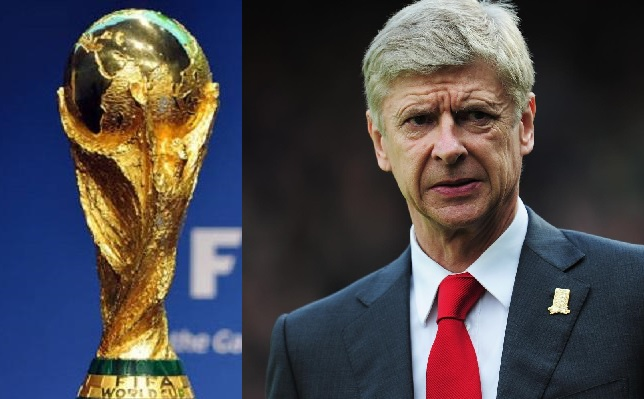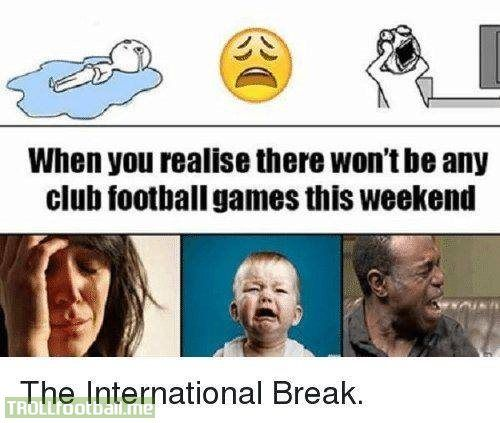Understanding Arsène Wenger's World Cup Idea
Let me start by professing that I know where most people stand on this.
When I decide to write about this, I was expecting to write a post summarising everything and reach a quick conclusion only to find a much deeper issue at play.
This post will be a series of three parts. One which will go through the full issue with international football, another that will discuss all the negative aspects of it, and a third that will actually highlight the positives of it. The last part will be accompanied by my conclusion.
The Issue With Internation Football
I don't think there's something that sums up the issue with international football breaks more than the memes that come out whenever there's time for one.
The issue with the international football breaks is that
- A) Well, they're mostly boring.
And
- B) Clubs suffer thanks to them from players' injuries.
Some clubs often find themselves in disputes with international FAs with certain players are asked for, arguments over injuries, and having to deal with fatigued players.
A General Solution
On the 4th of October 2017, sports journalist Tim Wigmore wrote an article for the Independent. In the article he detailed the issue and proposed a suggestion to fix the issue holding back international football. The suggestion can be summed up as followed:
Remove all international breaks throughout the season.
Play all international games after the end of the season.
Two points in which we will dive now
Remove all international breaks throughout the season.
When you remove the international breaks during the season you save up at least 7-9 weeks instantly. If we average this, it could mean the season would end in late April rather than the usual late June.
Players will take a two-week break into mid-May.
Play all international games after the end of the season.
After the two-week break, international teams would have another 2 weeks of preparation ahead of whatever qualification matches they might have to play.
Benefits to the suggestion
- Injuries will decrease throughout the season
- Decrease of time wasted in flights between the club and international team camp
- Disputes between clubs and FAs will decrease over players call-ups
- The leagues will be more competitive and exciting
- There will be a real chance for international teams for trial and error as players would spend a month and a half together.
- International players' form will be better, therefore the games will be more exciting
The Issue with the Suggestion
There are two ways to go about doing the end-of-season international games. Either A) Hosting the games in one place. Or B) Continue with the home and away system in current qualifiers. Each of those comes with its selective issue.
Hosting the games in one place
You will need to work out the logistics of hosting such an event across multiple countries that are close to each other as you can't realistically host it in one country. No country has the infrastructure to host all the games and accommodate all the international fans.
Another issue is that aside from the hosting countries, no international team will get to play at home. This renders so much work on football infrastructure pointless and also eliminates the chance of the less fortunate countries from having the people seeing their international team play live.
Continue with the home and away system in current qualifiers.
This one will have all the aforementioned benefits, except it will have all the downside of increased time wasted in flights and all the subsequential aftermath that comes with that.
What Does All of That Have to do With The World Cup Idea?
The reason Tim Wigmore's article in specific is mentioned is that it served as the seed with which Saudi Arabia suggested to Fifa the reproposal of playing a World Cup every two years. We will come back to that reproposal part later.
If you are unaware of the proposal, here's a quick rundown. Last May, Saudi Arabia proposed World Cups happening every two years to Fifa. Fifa president Gianni Infantino and Chief of Global Football Development Arsène Wenger said that they will seriously consider the proposal.
So much so that Wenger held a meeting with his team and the media in which he discussed in detail the proposal.
Wenger relayed the same idea laid by Wigmore with one main change:
Instead of having international games, friendlies, and qualifiers, played in the summer, they will be played in October.
The World Cup will happen every even year while the remaining tournaments, such as the continental tournaments, will be played in odd years. The proposal also erases new tournaments and championships such as the Europe Nations League.
Why did I say "Reproposal"?
Over 20 years ago, Sepp Blatter, Fifa's president at the time has actually pushed to make the World Cup a competition that happens every two years. So, this wasn't the first, second, or even third instance where the suggestion was made.
In Conclusion
In theory, the new proposal will have made the most of the football schedule. Maximizing benefits from time year-round. In October you will have your qualifiers and friendlies, throughout the season you will have your club leagues and European competitions, and in the summer you will have an international tournament, be it the World Cup, or any of the continental competitions.
There are a lot of issues to discuss regarding this subject. Issues like whether this would cause the World Cup to lose its magic, whether it will save international football, whether it is even rationally possible. As well as the subject of football viewership declining, even more so in younger demographics. All of those will be covered in the next parts as we discuss the cons and pros of such a proposal.




Hi @amirtheawesome1,
Thank you for participating in the #teamuk curated tag. We have upvoted your quality content.
For more information visit our discord https://discord.gg/8CVx2Am
Congratulations @amirtheawesome1! You have completed the following achievement on the Hive blockchain and have been rewarded with new badge(s):
Your next target is to reach 2500 replies.
You can view your badges on your board and compare yourself to others in the Ranking
If you no longer want to receive notifications, reply to this comment with the word
STOPCheck out the last post from @hivebuzz:
Support the HiveBuzz project. Vote for our proposal!
I've not read the Tom Wigmore article before but in general I am in agreement with those proposals. Trying to have a dedicated time for international football would be beneficial to domestic leagues and to the international game.
However, I think the biggest change that is necessary in international football is to cut down the number of meaningless and uncompetitive matches that take place.
For example, England's recent World Cup qualifying group saw them play 4 of their 10 matches against San Marino and Andorra. These are nations of approximately 30,000 and 70,000 people going up against a country with a population of nearly 50million! It's amateur players vs some of the top professionals in the world. The aggregate score for these 4 games was 24 - 0 to England.
There is no reason for England to have to play these matches and I can't believe that it helps the development of football in either of the other 2 countries.
As for where to stage the games, well the advantage of neutral venues would be that you could further cut down the number of fixtures by not having to play every opponent twice as you do now with the home and away schedule.
I disagree that a single country couldn't host it, the developed nations could. For example the UK has over 60 sports stadiums with a 20,000+ capacity and over 20 with a 40,000+ capacity. Equally, as we saw with this summers Euro's it's pretty easy to schedule games across multiple countries.
In general I'm against the idea of having the World Cup every 2 years. You can have too much of a good thing and FIFA trying to push it will likely result in clubs and players taking matters into their own hands i.e. break away Super Leagues and/or early retirements from international football.
That's actually the issue. I actually find his suggestion to be very good, but it is being taken somewhere else.
I actually agree with that. I even covered it in a previous post
It is once you take a look at the full scale of it. Qualifiers Have many more countries than in the Euros. It is not just stadiums and capacity. You have to take into consideration the thousands of people who will travel per country, bearing in mind those stadiums would serve as neutral ground therefore the 40K capacity stadium also means 40K people to be hosted in a city. And that's just one match. In Europe for example, there are 55 European teams, even if we talk about 20K people coming per team, that's a total of 1.08 million people (excluding the host country fans). And that's the lowest estimate.
Also, like, I said. Many supporters will be deprived of seeing their team playing at home. FAs, ministries, and governments have developed stadiums for these games. Local advertisements and revenues are reasons why governments would build a stadium.
As for the rest, I am trying to go through everything as thoroughly as possible rather. When I started I was expecting a quick run down, but it proved to be much more complicated than just one or two points. You would be surprised by how many developing countries/countries not that good at football currently would benefit from this in the long run. Arab/African players increasing presence in top teams started from similar exposure to that a World Cup every 2 years could provide.
Simply put, it opens up possibilities, some might be bad, but some might be good as well. My point in this series is to look at the whole picture subjectively.
Great, we get to fail to qualify for the World Cup every 2 years instead of every 4 years 😃
Lol! As an Iraqi, I share the same sentiment.
I like this one.
A good idea, how that would work in practice is another thing.
Not necessarily true, players would still be playing/training on the dates where breaks would occur so still liable to potential injury.
You are right though in that it is a huge topic, and will be a challenge to implement whatever changes arise from the process of options being considered.
Looking forward to the next instalment.